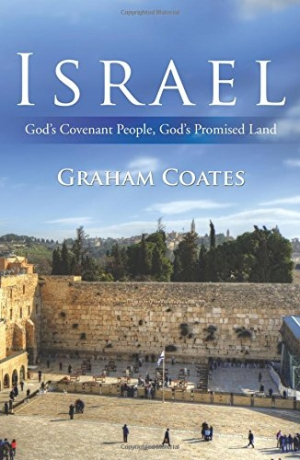Israel
God's Covenant People, God's Promised Land
Israel seeks to change theological discussions about Israel’s place in Christian worldviews.
Graham Coates’s passionate Israel: God’s Covenant People, God’s Promised Land explores Israel’s position within Christianity.
Drawing from a conservative religious perspective, the book argues that Christians need to reconsider the place of Israel in both their theologies and their worldviews. It rejects the “replacement theology” approach to Israel, which considers the Hebrew Bible fulfilled by the New Testament.
Using the Bible, history, and current events, it argues that Israel is exceptional—continued evidence of a God-created miracle. Its topics include the lost tribes of Israel, the history of Israel from its founding to today, and underlying covenantal and theological issues.
The Bible serves as the text’s guiding framework. Three sections—“God’s Covenant People,” “The Bones are Rattling,” and “Tendons, Flesh, and Skin”—are built around a close reading of its texts coupled with a detailed consideration of Israel’s history, both ancient and modern. The book’s view is that biblical prophecies are literally and figuratively coming true in the current state of Israel. This argument eschews some historical and scholarly understandings to the contrary, though its arguments that Christianity has frequently held anti-Semitic views and policies are accurate. Its reading of the Bible simply does not fix that problem.
The writing effortlessly mixes biblical language with modern historical and theological insights. It is detailed, specific, and bolstered by significant footnotes and documentation. Its ongoing metaphor of the valley of dry bones from Ezekiel is well presented.
The book builds upon the biblical image, beginning with the rattling bones, then adding the tendons and connecting tissue to show Israel’s changes and development in line with God’s promises. With the book’s passion comes a lack of nuance, though. Here, Israel is just heroic; in reality, it is a nation filled with people who are human and thus prone to human flaws. Here, Israel is placed so high on a pedestal that it simply becomes a different kind of caricature.
Its argument that Israel is beloved of God and destined for great things, meaning both the people and the nation are exceptional in God’s eyes, is more convincing. Covering a wide range of history, from Israel’s wise water recycling efforts to its mighty fighter jets to being justified in its dealings with the Palestinian state, it argues that Israel has an unconditional and everlasting covenant with God. Historical facts combine in the text to form an argument that not only is God important to Israel, but Israel is blessed with wisdom, strength, and purpose.
This work does not compellingly bridge the gap between Christianity and a covenant-bound Israel, though. The issues implicit in replacement theology are still there; it still views Israel as in need of completion through Jesus but does not clarify what function Jesus would play in this miraculously presented nation. Its solutions to this logical issue involve suggestions that Israel is waiting for Jesus to come; they are unsatisfactory.
Israel seeks to change theological discussions about Israel’s place in Christian worldviews.
Reviewed by
Jeremiah Rood
Disclosure: This article is not an endorsement, but a review. The publisher of this book provided free copies of the book and paid a small fee to have their book reviewed by a professional reviewer. Foreword Reviews and Clarion Reviews make no guarantee that the publisher will receive a positive review. Foreword Magazine, Inc. is disclosing this in accordance with the Federal Trade Commission’s 16 CFR, Part 255.

